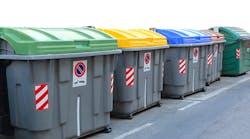A new report, “Reforming for a Better Deal: How to Align Cost Savings, Sustainability and Stability in NYC's Commercial Waste System” TransformDontTrashNYC.org from the Transform Don’t Trash NYC coalition, finds that small businesses will be overcharged to comply with the latest recycling regulations unless the city takes action. The report recommends that New York follow the lead of model cities around the country and enact policies to root out inefficiencies in the commercial sanitation industry so that increased recycling does not mean higher costs for small businesses.
New commercial recycling rules, which went into effect July 19, require all businesses to separate paper, metal, glass and plastic containers from refuse (previously different recycling rules applied to different types of businesses). Large food generators also will be required to compost. Finally, commercial sanitation companies will be barred from commingling separated recyclable materials in the same garbage truck as trash.
“Mayor (Bill) de Blasio’s new recycling rules are a big step forward for New York City and our goal of Zero Waste by 2030,” said Justin Wood, community organizer at New York Lawyers for the Public Interest and a co-author of the report. “The next step will be implementing a commercial waste zone system, which other cities have used to bring efficiency to this industry. Without the efficiency of commercial waste zones, more recycling will mean more garbage trucks on our streets and higher costs for small businesses.”
What Is a Commercial Waste Zone?
Under a commercial waste zone policy, which the de Blasio administration is currently evaluating as part of its OneNYC plan, the city would be divided into zones and private sanitation companies would be required to bid for the exclusive right to serve a given zone. Companies would be selected on a range of factors, including low prices for customers, reduced truck traffic and robust recycling plans.
The report points to model cities around the country that have already enacted this policy, including San Francisco, Seattle and Oakland. Unlike New York, where many businesses must pay extra for composting or some recycling, those cities make recycling and composting either free for small businesses, or charge less than for garbage pickup.
The report also finds that cities with commercial waste zone policies have much more stable collection prices than New York. The only protection for New York City small businesses is a rate cap set by the Business Integrity Commission, which has increased by 55 percent in the past decade.
Los Angeles is the latest city to modernize its commercial sanitation system through a waste zone policy. That city, where waste zones will go into effect in July 2017, shares New York City’s goal of “Zero Waste” and found that increased recycling would bring higher prices and more collection trucks without the complementary efficiency reform.

